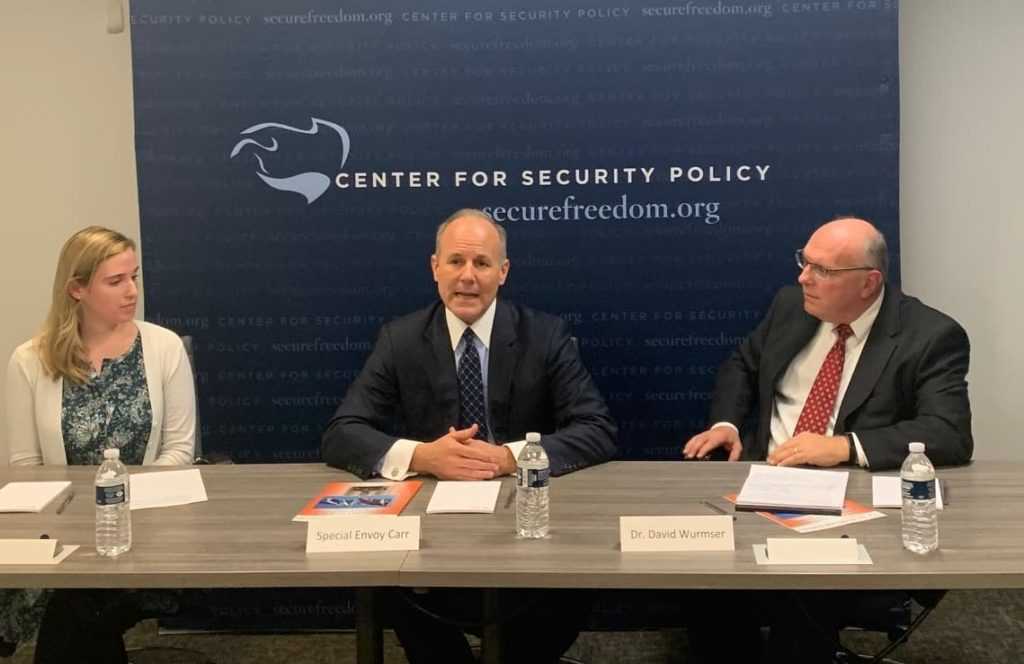Special Envoy Elan Carr: Trump’s point man in battle against ‘vile poison’ of anti-Semitism
On February 12, 2020 the Center hosted a panel on the rising tide of international anti-Semitism and the threat it poses to the United States. Elan Carr, the Department of State’s Special Envoy to Monitor and Combat Anti-Semitism, broadly outlined three sources contributing to the rising tide of anti-Semitism: ethnic supremacism on the right, hatred of Israel on the left and Islamist ideologies.

On February 12, 2020 the Center hosted a panel on the rising tide of international anti-Semitism and the threat it poses to the United States. The panel feature Elan Carr, the Department of State’s Special Envoy to Monitor and Combat Anti-Semitism, David Wurmser, Director of the Project on Global Anti-Semitism and the US-Israel Relationship at the Center, and analyst Maya Carlin.
Special Envoy Carr outlined the Trump administration’s robust outreach and coordination with foreign governments to combat anti-Semitism. Carr noted that President Trump has taken great personal interest in this topic and has on numerous occasions departed from script at events to highlight and honor survivors of the Holocaust. The President also often refers to anti-Semitism as the “vile poison.”
Elan Carr advises the Secretary of State and is responsible for directing U.S. policies and projects aimed at countering anti-Semitism throughout the world
“Poison” captures the president’s view as to just how dangerous he sees anti-Semitism to the US, and “vile” is a reaction to his deeply held belief that it violates American ideas and its sense of decency as a culture.
Special Envoy Carr broadly outlined three sources contributing to the rising tide of anti-Semitism: ethnic supremacism on the right, hatred of Israel on the left and Islamist ideologies.
Carr insisted that the hatred of Israel is a form of this hatred of Jews. To espouse the destruction of the state of Israel not only denies the Jewish people the very right to seek what has defined the Jewish people for thousands of years and makes up a strong part of Judaism, but it is advocacy of genocide of the millions of Jewish people. Criticism of Israel is one thing, but seething hatred and advocacy of destruction is another. Moreover, applying a “double standard” to Israel, wherein the Jewish community is subjected to a more demanding standard of behavior than even Western democracies hold themselves, or the denial to Israel of basic rights accorded to all other nations (such as the inherent right to self-defense) are also a form of anti-Semitism.
Special Envoy Carr noted that there is increasing interaction and coordination among all three sources of anti-Semitism, and that they can no longer be neatly divided nor politically labelled. Carr saw four critical areas of effort to confront the rising tide:
- Ensure Jewish community assets and people are secure, as the most basic function and responsibility of a government.
- Develop a strategy to confront the internet as the “chief vector” stimulating, enforcing, and even guiding hatred of Jews, especially among youth. While this requires strong supervision of parents, Carr believed the government has a role to play in prosecuting incitement and hate speech. While the First Amendment guarantees the right to free speech, incitement instigating criminal activity is not protected. Forms of hate-speech that are not criminal can still be called out as a threat and delegitimized.
- Leverage education to not only delegitimize hatred of Jews, but to teach children into the philo-Semitism which has been so central to our nation’s ideas since its inception.
- Make sure that in the tale of two Islams — one of moderate Muslims and their scholars, and one of violent and hatred-filled Islamist ideologues –policies aim to empower those who are fighting for what is right and help them in their quest to undermine those who are dangerous.
An archive of the Center’s livestream event is embedded above and can be linked to directly on YouTube here.
- Frank Gaffney departs CSP after 36 years - September 27, 2024
- LIVE NOW – Weaponization of US Government Symposium - April 9, 2024
- CSP author of “Big Intel” is American Thought Leaders guest on Epoch TV - February 23, 2024
